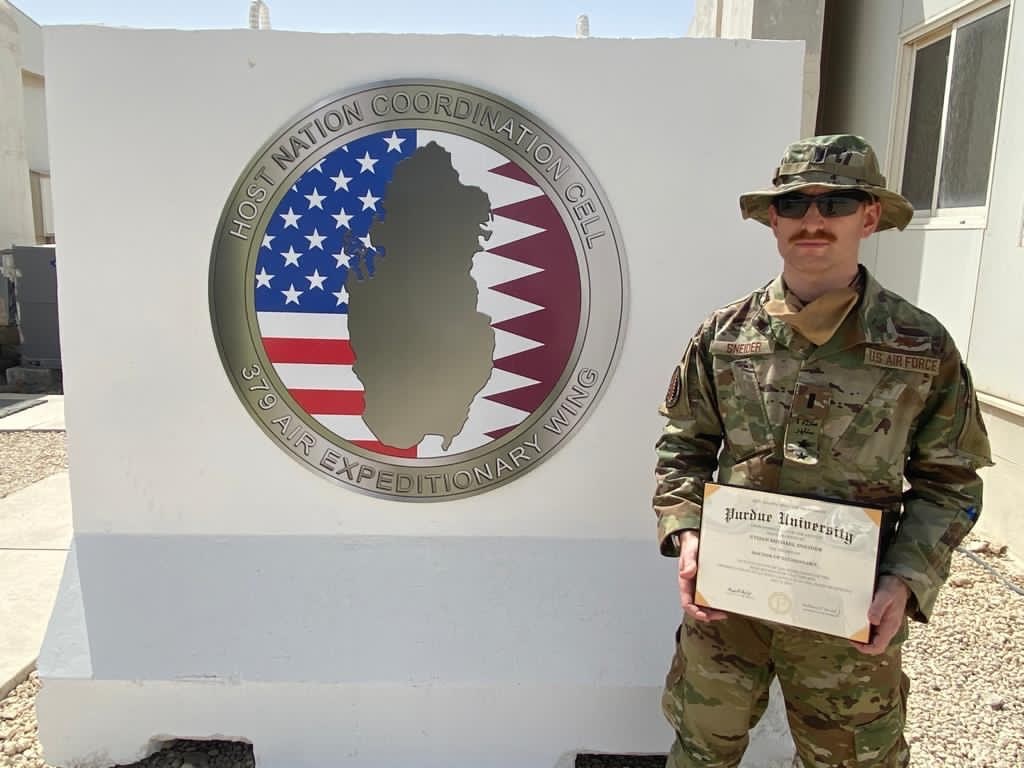
In the wake of a global pandemic, online learning became the dominant mode for students of all types and from all over, but it wasn’t a virus that brought Ethan Sneider to Purdue’s Doctor of Technology (D.Tech.) program online.
Now the first graduate of the fully online version of D.Tech., Lt. Sneider was an Air Force cyber operations officer stationed in Hawaii and Qatar while he worked on his advanced degree from Purdue, completing it in less than three years.
“He literally defended his dissertation standing next to his bunk bed,” said Kathryne Newton, associate dean for graduate programs in the Purdue Polytechnic Institute.
Sneider couldn’t have made his giant leap without the online Doctor of Technology option.
“The asynchronous learning enabled my participation while on active duty and also while deployed in the Middle East,” said Sneider, a May 2021 graduate. “The curriculum and professors were accommodating and flexible with my service commitments, making it possible to complete course requirements on my time and at my own pace.”
Sneider, hometown Concord, Mass., earned his bachelor’s in management from the University of Massachusetts at Amherst and a master’s in political science with a specialization in national security studies from the University of Haifa, Israel. His father was an inspiration for pursing a doctorate – and a Purdue degree in particular. Richard Sneider received his doctorate in Industrial Engineering from Purdue in 1980.
“I wanted to matriculate from Purdue with a PhD, and then start my own consulting company, as he did,” Sneider said. “I’ve always looked up to him as a role model, and plan to follow his lead in finding professional success.”
He said a degree from Purdue also figured to give him credibility and relevance as a thought-leader in his planned consulting career and to position him as an in-demand consultant. Sneider’s dissertation focused on cloud computing and an analysis of leadership practices among multi-national corporations adopting commercial cloud-computing platforms and using automated tools to migrate to those systems.
Although Purdue’s online Doctor of Technology program was flexible enough that he could fit it into his Air Force mission, Sneider said the program was nonetheless rigorous even by Purdue’s standards. His faculty committee constantly challenged his research and at the same time encouraged its progression, he said. The guidance from experienced faculty with diverse viewpoints helped him refine and strengthen his ideas, methodology and results and ensure that his research was systematic, replicable and catalogued.
Newton said the Doctor of Technology program, whether taken on campus or online, is intentionally designed so students, beyond some core courses, can build a personalized curriculum focused on enhancing their careers and benefitting organizations for which they work.
Linda Naimi, Sneider’s major professor, said Sneider took full advantage of the opportunity to focus on applied research that provided actionable insights immediately applicable to his job, which included managing communications and information security operations, among other things.
Naimi, an associate professor in the Department of Technology Leadership and Innovation, said Sneider’s story is inspirational, as well as being a prime example of how Purdue’s online programs can make education accessible to all types of students.
“I think it will encourage others in the service to seek higher education,” Naimi said. “I think it will encourage others who may have thought a doctoral degree was beyond their reach. And I think it uplifts the spirit to see how this young man, even while being stationed in Hawaii, then deployed in Qatar, and in the midst of COVID and international terrorism, managed to complete the online doctorate in less than three years.”
Sneider’s next assignment is with the Air Force’s Kessel Run Experimental Lab in Boston, which builds, tests, delivers, operates and maintains cloud-based infrastructure and software applications for use by Air Force personnel worldwide. His active-duty service commitment concludes in 2022, after which he plans to start a new chapter in business and technology consulting.
He’s Purdue’s first online Doctor of Technology but he won’t be the last. The program has proven popular and the next graduates should be done in December, Newton said. For more information about the online Doctor of Technology degree visit the program website.
Writer: Greg Kline, 765-426-8545, gkline@purdue.edu
Sources: Ethan Sneider, esneider@purdue.edu
Linda Naimi, lnaimi@purdue.edu
Kathryne Newton, kanewton@purdue.edu
